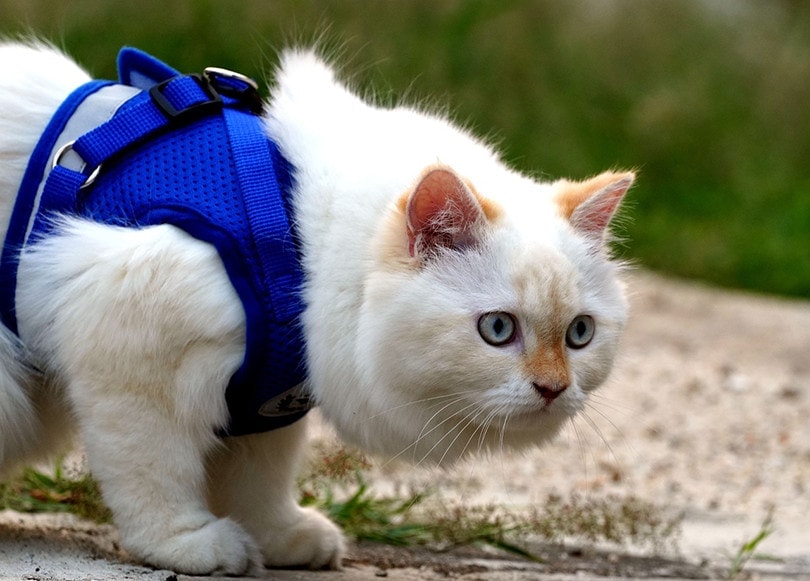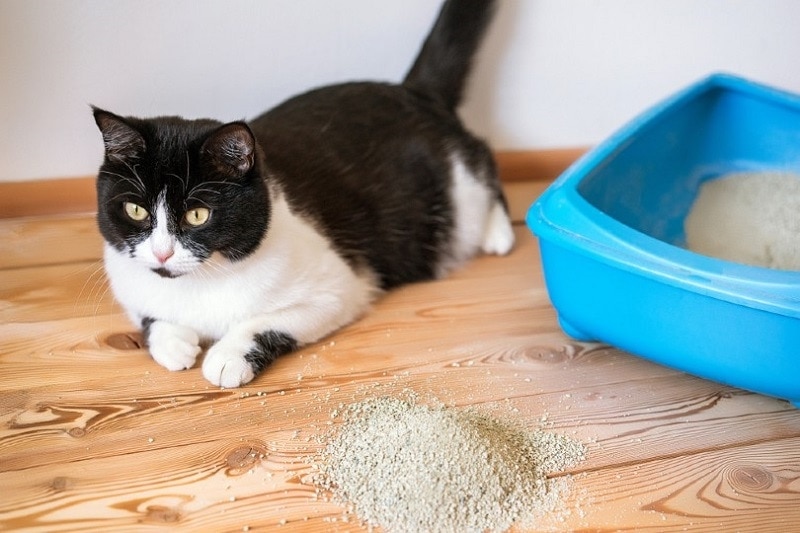How Much Does a British Shorthair Cost? 2024 Price Guide
Updated on
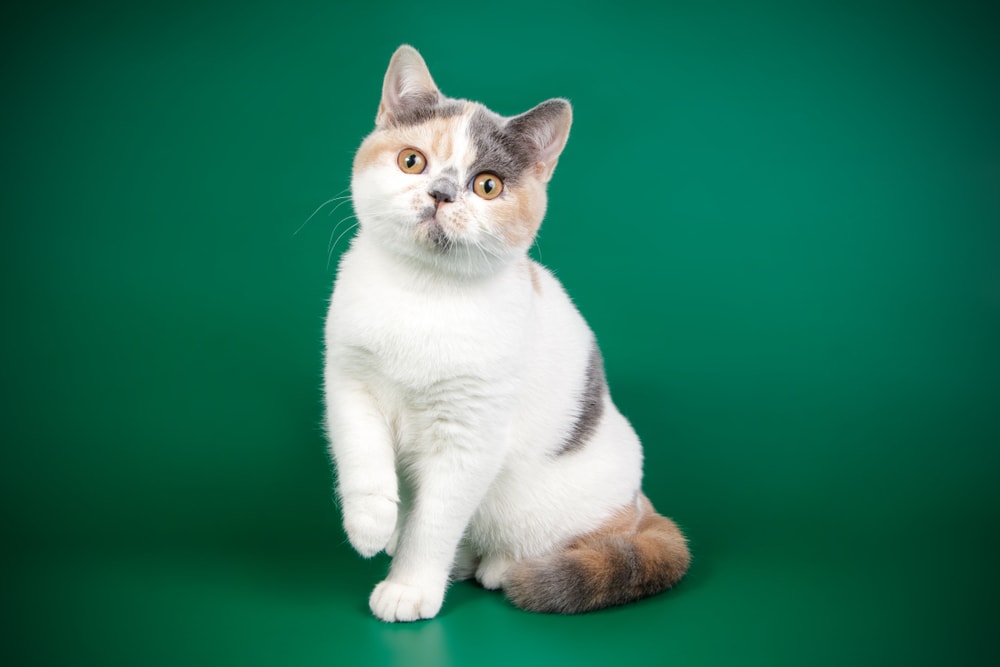
British Shorthairs are quite a popular feline in the U.K., where they originated. However, they are also gaining popularity in other countries, such as the United States. The price of this feline largely depends on where you are because they are more common in some countries than others.
It also depends on the quality of the feline. Most top-of-the-line cats cost around $1,500 to $3,000. However, you can find pet-quality cats for $800 and up. It mostly depends on their pedigree. Those with more champions in their bloodline are more likely to be expensive.
Bringing Home a New British Shorthair: One-Time Costs
Most of your one-time costs are going to involve paying for the cat themselves. These are not inexpensive felines, and where you purchase them from does matter. Some breeders are cheaper than others.
On top of the actual price tag of the British Shorthair, you also have to consider all the one-time supplies that you’ll need. These cats are not particularly more expensive than others in this regard.
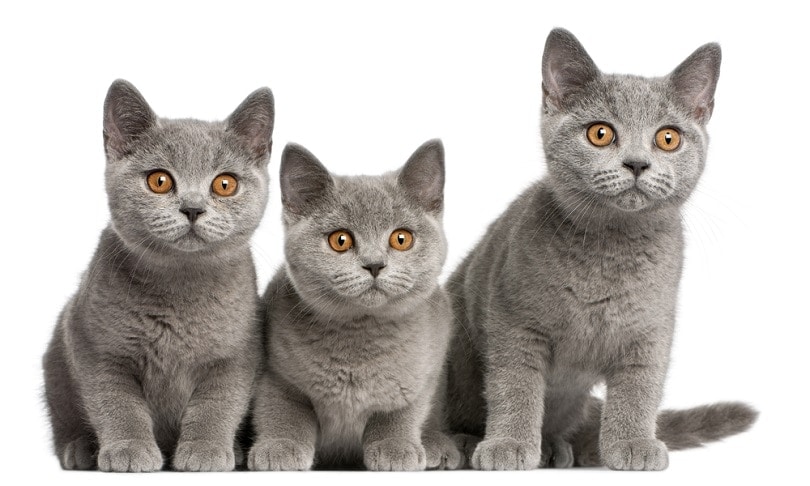
Free
In some cases, you will find these cats for free. These are typically the result of accidental litters. In an attempt to find a home for these kittens, some people may advertise them for free.
However, the problem with these kittens is that they are often not bred or raised properly. Their parents are not health-tested before breeding, and most of the kittens don’t receive vet care. If they did, they likely wouldn’t be free. For this reason, these cats may be more prone to health problems. There is no way to tell if they have an underlying condition before you adopt them. This can raise your future vet costs substantially.
Adoption
- $50-$200
In some areas, it can be hard to find these cats for adoption. Usually, the only place that you can find these cats is at a breeder’s. Most breeders will take back cats if the owner can no longer care for them, which usually means that cats rarely end up in an animal shelter.
If you do find them in an animal shelter, though, you probably won’t pay extra for this breed over the other cats there. Most of the time, animal shelters charge about $50 to $200 for one of these cats. This is cheaper than it would cost at a breeder, though you have to get lucky to find one at a rescue facility.
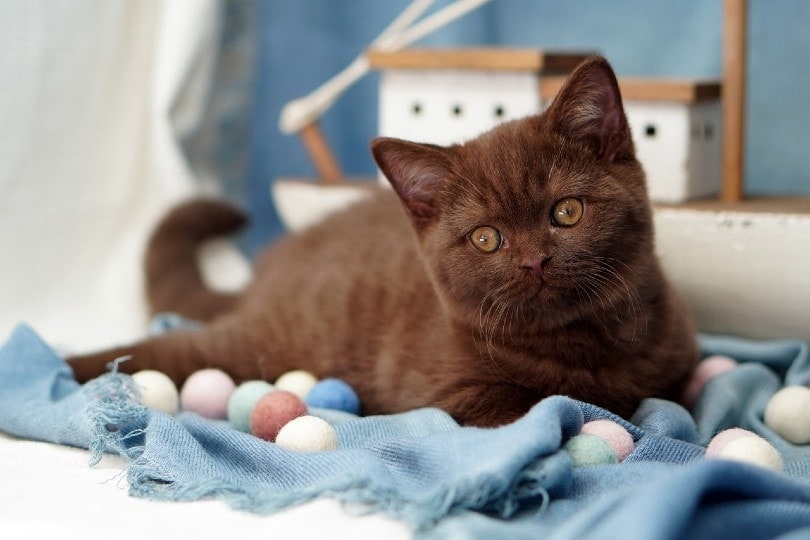
Breeder
- $800-$3,000
Breeders are usually the most expensive option, but that’s because they put a great deal of work into their kittens. Usually, kittens are well-socialized before being made available for adoption. Most breeders take their kittens to the vet at least once and start them on their required vaccinations. All this leads to better-behaved cats that adapt better to their new homes.
While you may pay extra for these cats up front, you may save money in the long run. These kittens are usually healthier and better socialized than other cats.
Initial Supplies and Setup
- $200-$605
Before bringing your kitten home, you will need various different supplies. The British Shorthair doesn’t require any different supplies from any normal cat, though. You’ll need toys, food bowls, a litter box, and similar items.
While most of these things will be fairly inexpensive individually, they can add up quickly in aggregate. You can expect to pay at least $200 on initial supplies. However, if you splurge on high-end products, your costs can rise considerably. For instance, most litter boxes are inexpensive. However, automatic boxes and those with fancy features can cost hundreds.
Be sure to budget appropriately for each item. You can get away with having these cats on a budget if you just purchase the bare minimum. However, it is quite easy to splurge and raise your costs.
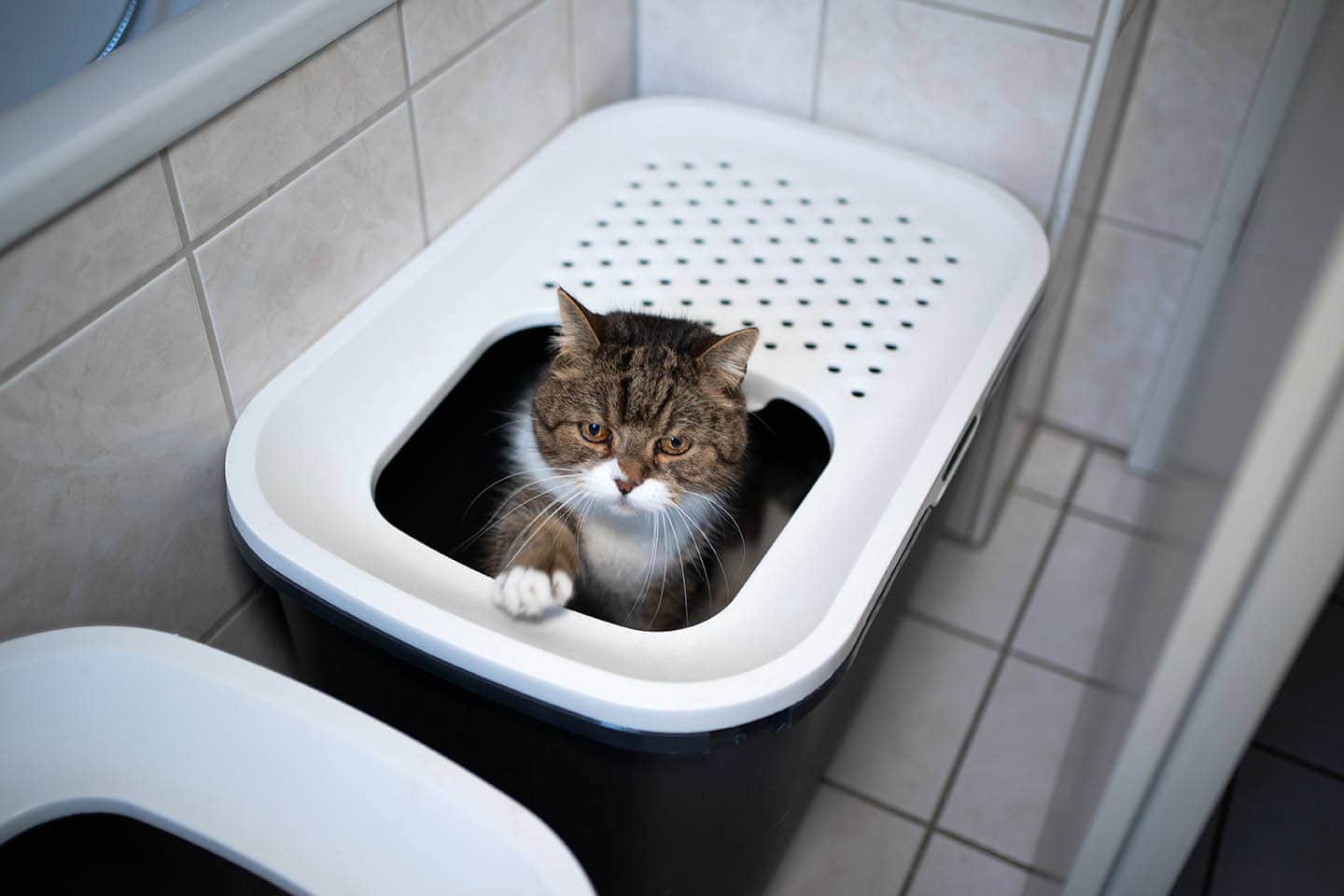
List of British Shorthair Care Supplies and Costs
| ID Tag and Collar | $15 |
| Spay/Neuter | $50-$200 |
| Microchip | $5-$50 |
| Litter Box | $25-$200 |
| Crate | $30 |
| Bed | $20-$50 |
| Litter Scoop | $5-$25 |
| Toys | $20-$50 |
| Food and Water Bowls | $10 |
| Brush | $20-$30 |
How Much Does a British Shorthair Cost Per Month?
- $120-$630 per month
Most people won’t pay more than $300 a month for their British Shorthair. However, health problems and similar costs can quickly raise your budget by hundreds. Sickly cats will require extensive care and extra expenses. A single surgery can easily cost over $1,000.
Pet insurance is often recommended to avoid these sudden vet bills. This can add quite a bit to your monthly costs, but in the long run, insurance can help you save money if your cat ends up needing extra vet care.
The most expensive part of owning a cat will likely be the medical bills, but you should budget appropriately for other costs as well. Some of these can add up quickly over time.
Health Care
- $75-$535 per month
This section includes everything that your cat needs to stay healthy. This includes vet care, which can vary widely in cost. Most people will find that their biggest expenses are in this category, especially if they don’t have pet insurance.
Food is also in this category. Cats are smaller pets, so they usually don’t cost that much to feed. The British Shorthair is no different.
Pet insurance and grooming costs typically won’t cost that much either, though it depends on what you choose. Some pet insurance can be very expensive, and if you choose to take your cat to the groomer’s regularly, that will cost more.
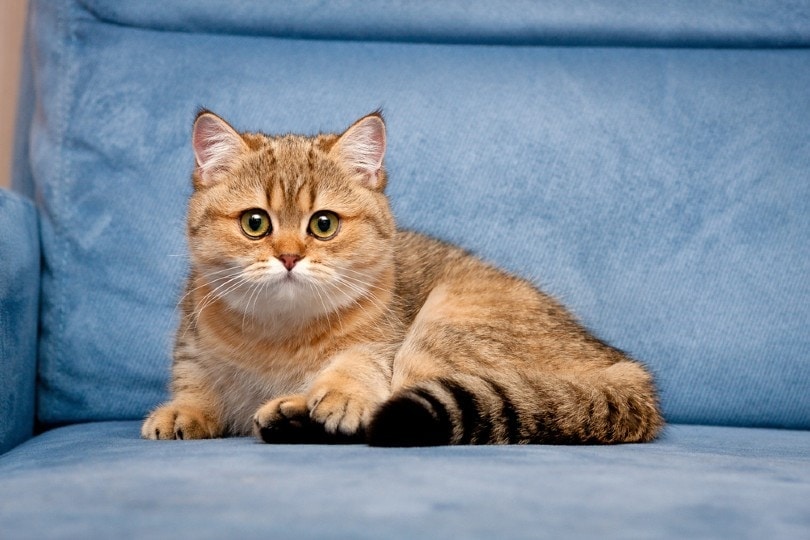
Food
- $30-$60 per month
The British Shorthair does not require any particular diet. They do just fine on a high-quality commercial cat food. They are not huge cats, so you won’t be paying more for food than you might expect. Most people will pay about $50 for their cat’s food each month, assuming that you’re purchasing a high-quality option.
While you can save money by purchasing a lower-quality food, you likely won’t save that much. A few dollars here and there may add up, but you shouldn’t risk your cat’s health.
We recommend a food that includes plenty of meat and protein, which are exactly the things that your cat needs to thrive.
Grooming
- $0-$25 per month
These cats do not require much grooming. They do shed, so we recommend that you brush them regularly. However, they typically won’t require any professional grooming. You can easily take care of their needs at home with a simple brush.
If you take care of all your cat’s hygiene needs at home, they will not need to go to a groomer at all. This means that you won’t spend anything on grooming. You may need to purchase a new brush every few years, but this cost will be minimal.
Of course, you can decide to send your cat to a groomer occasionally. This will add to your costs, of course. How much depends on the frequency of the visits.
- You may also like: 6 Types of British Shorthair Cat Colors
Medication and Vet Visits
- $20-$100 per month
British Shorthairs aren’t that prone to many health problems. For the most part, they are quite healthy. Therefore, their vet bills likely won’t cost more than $20 a month. This includes preventative vet care costs, like vaccinations and an annual exam. Flea and tick prevention are also included. If your cat is healthy, you shouldn’t expect to pay too much.
It’s if your cat develops a chronic condition that your costs will likely increase. Some conditions don’t cost more than $20 or so to treat each month, depending on the medication required. Others can cost substantially more. It depends on your cat’s health.
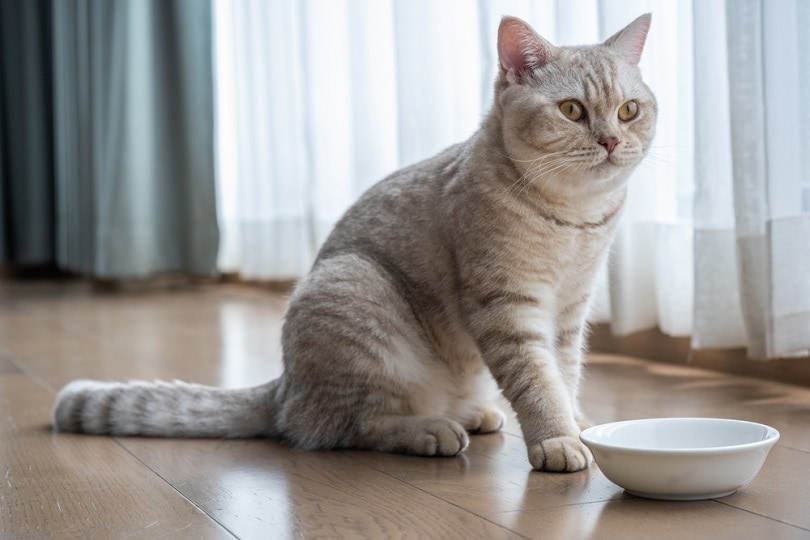
Pet Insurance
- $20-$70 per month
Pet insurance isn’t required but emergency care can be expensive. If your feline gets in an accident or develops a sudden health problem, it can be extremely expensive. Pet insurance helps cover some of these costs.
Generally, your costs will depend on what you choose in your plan. Some plans cover just about everything, while others only include accidents. While these accident-only plans are the cheapest, they are helpful only some of the time. Therefore, you won’t get a huge return on your investment.
Environmental Maintenance
- $30-$70 per month
The British Shorthair needs a litter box just like every other cat. Much of your monthly costs will go toward keeping this litterbox clean and well-maintained. You’ll likely need to purchase a new litterbox every year or so, unless you purchase an expensive model.
However, most of the time, you’ll just have to purchase new litter. Litter can cost anything from $30 to $70 a month. It mostly depends on what kind of litter you choose. Some cat litters are cheap, while others are significantly more expensive.
Some people may be perfectly fine with a budget litter, while others will want something higher quality or all natural. The latter will be more expensive.
There are also many optional items for litter boxes. You can have deodorizers and litter box liners. These may make your job a bit easier and help control the smell. However, they are completely optional. Usually, these won’t raise your costs that much, anyway.
| Cat Litter | $30-$70/month |
| Optional items | $5/month |
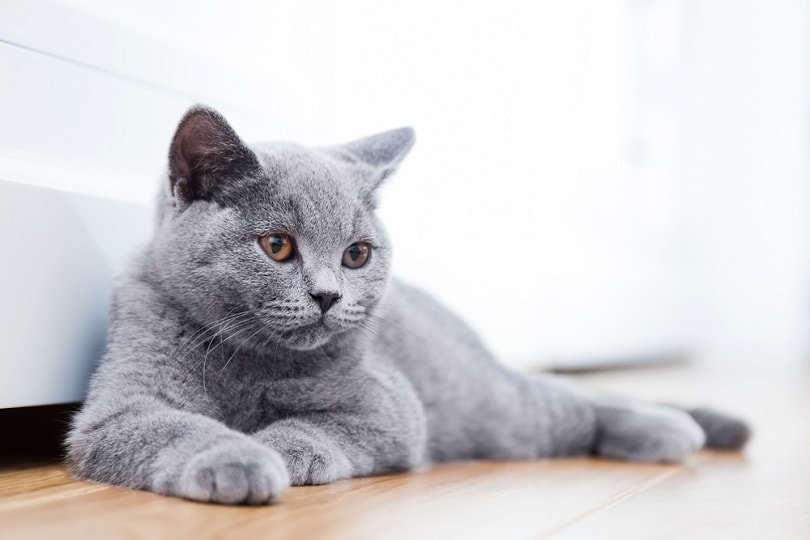
Entertainment
- $10-$20 per month
These cats aren’t extremely active, but they will require a few toys. You’ll need to replace these regularly — not because the cat will destroy them, but because they will likely get lost. It is also best to switch up your cat’s toys to keep them entertained and encourage them to exercise. Beyond this, these felines mostly spend their time sleeping or relaxing.
Unlike most cats, these felines don’t necessarily need a cat tree to expend their energy, though they will still benefit from one. They do like to climb, just like any other cat.
When purchasing toys, we recommend purchasing a variety. You never know what your cat is going to like, even if they seemed to like a particular kind of toy previously. Kittens usually aren’t affected by catnip, so avoid such toys until they get older.
Total Monthly Cost of Owning a British Shorthair
- $120-$630 per month
Most people will pay on the lower end of this price range. Your biggest cost will be health care, particularly pet insurance (if you decide to get it) and medications. If your cat ends up with a chronic health condition, you can expect to pay a decent amount to cover their medication and other treatments.
If you don’t have pet insurance, your costs could jump up to $600 a month with the added vet care. If you do get pet insurance, your costs will be a bit higher than the low end, even if your cat doesn’t have any health conditions.
You can do things to adjust your monthly costs. Most people will not pay $600 a month for their cat. Unless you splurge quite a bit, you typically don’t have to worry about it.
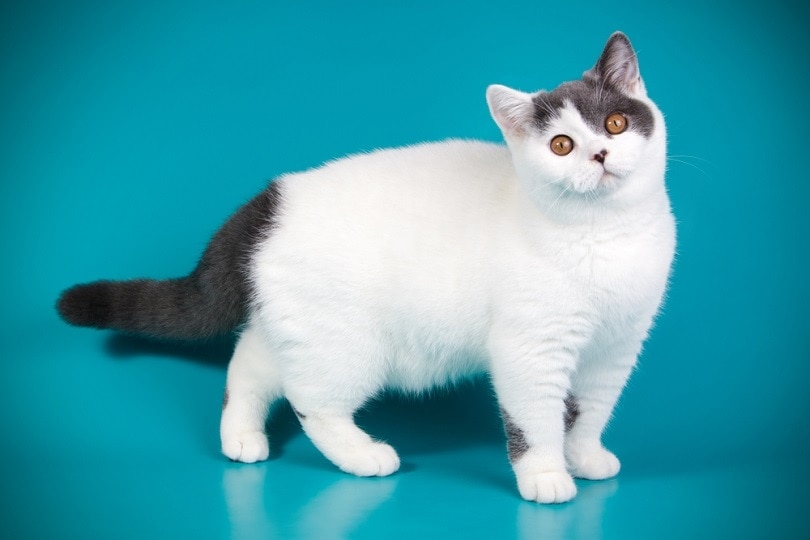
Owning a British Shorthair on a Budget
It is completely possible to own these cats on a budget. Your expenses are mostly going to involve the price of the cat themselves. They aren’t cheap, especially if you purchase them from a high-quality breeder. Most cats are going to be between $1,500 to $2,500. Your biggest concern will likely be budgeting for this.
You should absolutely not plan on purchasing a “budget” kitten. These cats will just cost you more in the future. If they are extremely inexpensive, you should be asking why.
Once you adopt your feline, there are a few different ways that you can save money. Often, this includes doing more things yourself and depending less on outside services, like a groomer.
Saving Money on British Shorthair Care
If you’re looking to save money, you should avoid splurging on supplies for your feline. This can add up quickly. However, this doesn’t mean purchasing the cheapest items available. You don’t want to get a ball that your cat will tear up in a few minutes, but you likely don’t need one that rolls around by itself.
You should buy in bulk when possible. Consider subscribing to a cat toy subscription box or purchasing a larger pack of toys when you do buy them. Purchase cat food in the largest available bag. Your cat will likely finish it before it goes stale.
Avoid taking a “pay less now” stance. If you are already purchasing the cheapest thing or avoiding certain costs, you’ll likely end up paying more later. For instance, if you avoid purchasing pet insurance to save money today, you may end up spending more money later. Be sure to take the whole cost into account, not just what you’ll be spending today.
Final Thoughts
These cats are quite expensive in the United States. Most breeders sell them for somewhere between $800 and $2,500. Truthfully, most British Shorthair cats are at the upper end of this range. You should expect to pay at least $1,500, unless you happen to find a breeder with a deal.
Furthermore, a breeder is about the only place that you can find this breed. They are too rare to appear at animal shelters and rescues, which often means that your only choice is a breeder.
Once you purchase a cat, though, your prices aren’t more than your average feline. You can expect to pay about $350 for initial supplies, with a monthly cost of anywhere from $120 to $630. You’ll likely pay on the lower end of this range unless your cat has a chronic health problem.
Your costs can easily go up if you go overboard on cat supplies, though. It is easy to buy an expensive litter box if you aren’t watching your spending. It is possible to own this cat on a budget, but you’ll have to avoid splurging on supplies.
Featured Image Credit: Irina Riedel, Shutterstock
